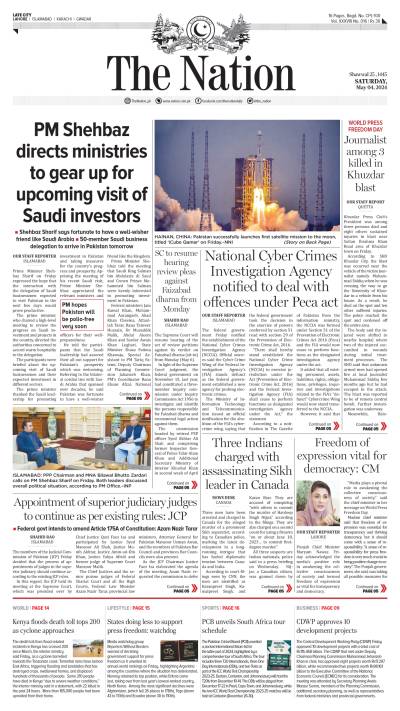In a reported move, the coalition partners have vowed to initiate an impeachment motion against General Musharraf under article 47 of the constitution of Pakistan if he fails to take a vote of confidence from the national and the four provincial assemblies immediately. The eventful announcement came after protracted negotiations between the heads of the principal partners of the ruling coalition spread over three bumpy days with periodic inputs from the leaderships of the ANP and JUI (F). The statement read out to the press accused General Musharraf of having "worked to undermine the transition to democracy" and "weakened the federation and eroded the trust of the nation". The chargesheet also targeted General Musharraf for resorting to "extra-judicial means" to sack the top judiciary and having pursued policies that led to an "economic impasse and the worst power shortage in the history of the county". The announcement also vowed to restore the sacked judiciary to its November 3 position under the Murree Declaration after the impeachment of General Musharraf, but fixed no timeframe for the same. To begin, one would call the move auspicious though it may have come through a trifle too late. Having eased into power as a consequence of the unmistakable verdict of the people on February 18 in favour of the genuine political forces of the country, the ruling coalition wasted precious time in procrastinating on the principal move to bury dictatorship and all its visible and invisible manifestations. Instead, it moved from Pakistan to Dubai to London and remained consumed by the fear of the prospect of the use of article 58(2)(b) by Musharraf and the attitude of the army high command towards the move of initiating impeachment proceedings against him. In some of my previous despatches, I had strongly pleaded for a swift and clinical operation to cleanse the country of all vestiges of dictatorship but, unfortunately, that was not to be. What, if any thing at all, has changed since the induction of the current coalition that it had to wait this long for making the move? I would say nothing except that it has afforded General Musharraf precious time to weigh his options in the event that he may have to face a situation that has now arisen. Five months ago, he was a defeated and demoralised person, possibly thinking of quitting on his own. Having indulged in useless sabre rattling, the coalition partners, more particularly the NROed leadership of Pakistan People's Party, unnecessarily contributed to giving him another lease of life whereby he even started dreaming of remaining in charge. Alongside that, he continued to hatch conspiracies against the democratic government to adversely impact its performance which, for a number of other reasons too, has been below par at best. General Musharraf had the option to use 58(2)(b) in February last as he has it today. Predominant chances are that he would not use it as that would plunge the country into an irretrievable chaos with the potential of pitting the people against the forces of the establishment. The reasons for a people's uprising are already there in abundance: the spiralling prices of the basic commodities, the energy shortage and costs, the ever deteriorating law and order situation, joblessness and the lengthening shadows of the menacing Talibanisation spectre. All that is needed is a spark. Using 58(2)(b) against a democratically elected government in spite of its below-par performance would be reason enough for an uncontrollable upsurge of human emotion. Two of the four provinces are already embattled against the establishment. Such an ill-advised move would put the other two in line to combat the evil forces for that one final encounter to decide once for all who is to rule this country: whether it would be ruled by its people through their genuinely elected representatives, or it would be ruled by the remnants of army dictators supported by other debilitating echelons of the establishment including a hand-picked judiciary and a derelict and inefficient bureaucracy? While it may not be beyond General Musharraf to indulge in this ultimate adventurism, I believe he would be advised against the move. That brings us to the most critical factor in the whole equation: the role of the army and, more particularly, that of its chief General Ashfaq Parvaiz Kayani. While he has often stated that the army has no political ambition and has, apparently, taken numerous concrete steps to drive the message home to his colleagues, his stance in the situation that has now arisen, remains of immense relevance, both for the future of democracy as well as for the country itself. Historically, together with the judiciary that can be targeted for the advent of dictatorship in the country through the evil coinage and repeated use of the 'doctrine of necessity', the army has to take bulk of the blame for the current travails the country suffers from. Would it again get involved on the pretext of institutional affiliation because it is a former commander of the army who is being impeached? Or, true to the word of its current commander, would it remain neutral and allow the dynamics of democracy take their own course? One has to acknowledge that the army has been deeply hurt by what it has suffered through years of involvement in political matters. Some of its former commanders have used it mercilessly for perpetuation and elongation of their political power in utter violation of the constitution. Its reputation and stature have been badly tarnished. I am sure General Kayani is not oblivious of this and his desire to keep it away from playing any further political role may be a result of such a realisation. Its controversial involvement in a fight against its own people in the absence of a mechanism to address it through political means would also be a matter of grave concern. Therefore, is it in a position to take any further bruising? How would that affect the morale of its personnel and where would it leave the institution to face the numerous professional challenges that are looming across the horizon? I believe good sense would prevail and democracy would be allowed the freedoms that are its integral right. Two issues concern me most. First, impeachment is not enough. General Musharraf should be tried in a court of law for having violated the constitution twice over. Second, a mere mention of restoring the judiciary in accordance with the Murree Declaration is all too familiar. Having been abused in the recent past, why should one believe that it would not be abused again? Does one smell a grand compromise behind the smoke screen of the purported move and possible success of the impeachment proceedings against General Musharraf? The dream of a democratic polity in the country would remain unfulfilled without a truly independent and fearless judiciary taking charge. Assigning that task to the PCOed judges would be a grave mistake. The writer is a media and political consultant based in Islamabad. E-mail: raoofhasan@hotmail.com
Sunday, May 05, 2024
Too little, too late
Judicial Revamp
May 05, 2024
Global Assassinations
May 05, 2024
Journalistic Peril
May 05, 2024
Tourist Tragedy
May 04, 2024
Ending Polio
May 04, 2024
Battling economic adversity
May 05, 2024
Importance of vaccinations
May 05, 2024
Jam Chakro Landfill
May 05, 2024
Livestock trade
May 05, 2024
Current state of affairs
May 04, 2024
ePaper - Nawaiwaqt
Advertisement
Nawaiwaqt Group | Copyright © 2024





